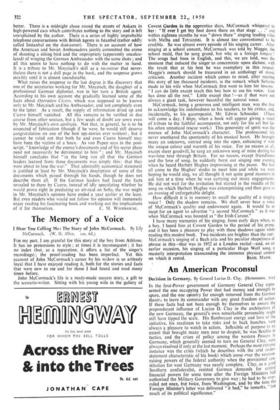The Memory of a Voice
I Hear You Calling Me: The Story of John McCormack. By Lily McCormack. (W. H. Allen. los. 6d.) FOR my part, I am grateful for this story of the boy from Athlone. It has no pretensions to style ; at times it is inconsequent ; it has no index (but, as a reparation, it offers a list of the singer's recordings); the proof-reading has been imperfect. Yet this account of John McCormack's career by his widow is so artlessly loyal that I have enjoyed reading it, both for the stories anj facts that were new to me and for those I had heard and read many times before.
John McCormack's life is a ready-made success story, a gift to the scenario-writer. Sitting with his young wife in the gallery of Covent Garden in tlfo apprentice days, McCormack whispered to her: " If ever I get -hi), foot down there on that stage . • ." and within eighteen months he was " down there " singing leading roles with Melba and Tetrazzini. It is almost too conventional to be credible. So was almost every episode of his singing career. After singing at a school concert, McCormack was told by Maggie, the school maid, that he sang grand, but why in a foreign tongue ? The songs had been in English, and this, we are told, was the moment that induced the singer to concentrate upon diction, with the result that at his best he was exemplary in this respect. Maggie's remark should be treasured in an anthology of music criticism. Another incident which comes to mind, after reading this story of ten thousand incidents, is the remark which Sabatini made to his wife when McCormack_first went to him for lessons: " I can do little except teach this boy how to use his voice. God has done all the rest." Little except that !—as if that were not always a giant task, however beautiful the natural voice.
McCormack, being a generous and intelligent man, was the first to acknowledge his indebtedness to his teachers, to his critics, and, incidentally, to his accompanist, Mr. Edwin Schneider. (There will come a day, 'I trope, when a book will appear giving a meed of tribute to the faithful accompanist, not only for his art but for his often unnoticed rescue work.) This generosity of spirit was the essence of John McCormack's character. The professional lite never smothered the spontaneity of his musical heart. He brought many an unknown, untried song into the open, enhancing it with the unique colour and warmth of his voice. For no reason at all, except sheer goodwill, he sang an unknown song of mine during his war-time tour through Britain. For no reason, except friendliness and the love of song, he suddenly burst out singing one evening when he heard Herbert Hughes improvising at the piano. We had all come to the Hughes' studio to meet him and while we were hoping he would sing, we all thought it not quite good manners to ask him at a time when he was carrying out many engagements. He did not wait for the invitation but started in the middle of the song on which Herbert Hughes was extemporising and then gave us an evening of unforgettable delight.
How difficult it is in memory to recall the quality of a singing voice ! Only the shadow remains. We shall never hear a voice Of McCormack's quality and endowment again. It would be as inept for an agent to advertise " a second McCormack " as it was when McCormack was boosted as " the Irish Caruso."
I have many memories of his singing, from early days when, as a boy, I heard him at Covent Garden to the period of his prime, and it has been a pleasure to play with these shadows again while reading this modest book. Two incidents are brighter than the rest: McCormack's singing of a Bach aria and his peculiar shapeliness of phrase in this—that was in 1932 at a London recital—and, on an earlier occasion, his singing of a particular Hugo Wolf song, a masterly interpretation transcending the immense physical control






































 Previous page
Previous page